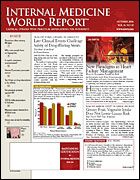Publication
Article
Internal Medicine World Report
Role of Vitamins/Minerals in Disease Prevention Inconclusive
Author(s):
MARYLAND?In generally healthy people, available evidence for the safety and efficacy of multivitamin/mineral supplementation is insufficient to warrant recommendations for their role in the prevention of chronic diseases, with a few exceptions, according to data presented at the Conference on Multivitamin/Mineral Supplements and Chronic Disease Prevention based on a panel of experts reviewing the evidence.
"More than half of American adults are taking dietary supplements, the majority of which are multivitamins/ minerals, and the bottom line is that we don't know for sure that they're benefiting from them," said J. Michael McGinnis, MD, MPP, senior scholar with the Institute of Medicine of the National Academy of Sciences, and chair of the expert panel who looked at the evidence.
"In fact, we're concerned that some people may be getting too much of certain nutrients," Dr McGinnis said.
The panel, which was convened by the National Institutes of Health Office of Medical Application of Research and the Office of Dietary Supplements to assess the data on the efficacy and safety of multivitamin/mineral supplementations in the prevention of chronic disease, presented its preliminary findings at the meeting in a statement that included the following recommendations:
? Use of calcium plus vitamin D supplementation for postmenopausal women to protect bone health
? Use of antioxidants and zinc for nonsmoking adults with intermediate-stage, age-related macular degeneration (AMD)
? Folate for women of childbearing age to prevent neural tube defects in infants
? Caution smokers against taking beta carotene; strong evidence links regular use of beta carotene to an increased risk of lung cancer among smokers.
The evidence did not support the use of beta carotene supplements for the general population.
In looking specifically at multivitamin/mineral supplements for chronic disease prevention, the panel found that available data are insufficient to make firm recommendations for or against their use in the general population.
Similarly, a new review of several randomized controlled trials that included 47,289 persons who have used multivitamin/mineral supplementations showed that there was not enough evidence to prove or dismiss the benefits of such supplementation for the prevention of cancer and/or chronic disease (Ann Intern Med. 2006; 145: 372-385).
This study included a total of 12 publications based on 5 randomized controlled trials that examined efficacy?including the Linxian General Population Trial and the Suppl?mentation en VItamines et Min?raux AntioXydants (SU.VI.MAX) study?and 8 publications based on 4 randomized controlled trials and 3 case reports on adverse effects. The data revealed some benefits, as well as conflicting findings.
Researchers reviewed articles published on MEDLINE, EMBASE, and Cochrane databases through February 2006 and hand-searched relevant journals and other articles. Studies that included data on designed vitamin and mineral combinations were included; those that evaluated 1-a-day formulations of vitamins and minerals were excluded.
Chronic Diseases
Cardiovascular Disease (CVD). Multivitamin/mineral supplementation had no significant effect on CVD. The SU.VI. MAX study found no significant difference in the incidence of ischemic CVD in either men or women when compared with placebo.
In contrast, the Linxian trial showed a reduced rate of stroke-related mortality in persons taking beta carotene, selenium, alpha-tocopherol, retinol, and zinc (relative risk, 0.71).
Hypertension. The SU.VI.MAX trial found no differences in hypertension risk between the antioxidant group and the placebo group.
The Linxian trial showed that use of beta carotene, selenium, and alpha-tocopherol increased the incidence of isolated diastolic hypertension (relative risk, 1.23) but not of isolated systolic hypertension or overall hypertension.
The rate of isolated diastolic hypertension was lower in those taking riboflavin, niacin, vitamin C, and molybdenum compared with placebo. The prevalence of hypertension in other groups did not differ from that in the placebo group in the Linxian trial.
Cataracts, AMD. Vitamin/mineral supplementation had no significant effect on cataracts, although a combination of 7 vitamins and minerals did stabilize visual acuity loss in one small trial.
The combination of zinc and antioxidant supplements slowed the progression of advanced AMD in high-risk persons.
Cancer Prevention
The Linxian trial showed that combined supplementation with beta carotene, alpha-tocopherol, and selenium decreased the incidence of gastric cancer and the overall mortality rate from any cancer by 13% to 21%.
In the SU.VI.MAX study, combined supplementation with vitamin C, vitamin E, beta carotene, selenium, and zinc decreased the rate of cancer by 31% in men, but had no effects on cancer rates in women.
Mortality Rate
Combined data on total mortality rates showed no increased or decreased risk among multivitamin/mineral supplement users.
In the Linxian trail, the total number of deaths was lower among those taking beta carotene, alpha-tocopherol, and selenium (relative risk, 0.91), but not in those taking other supplementation combinations.
The SU.VI.MAX study showed a reduced number of deaths in men taking antioxidant and zinc supplements compared with placebo (relative risk, 0.63) but not in women (relative risk, 1.03).
"Our conclusion is that the strength of evidence is insufficient to support the presence or the absence of a benefit from routine use of multivitamin and mineral supplements by adults in the United States for primary prevention of cancer, cardiovascular disease, hypertension, cataracts, or age-related macular degeneration," wrote lead investigator Han-Yao Huang, PhD, MPH, of the Bloomberg School of Public Health and the School of Medicine, Johns Hopkins University, and colleagues.
The National Institutes of Health's statement is available at www.consensus.nih.gov
Key points
? Although current evidence does not support the role of vitamin supplementation for disease/death prevention, some benefits have been seen.
? Experts recommend:
? Calcium + vitamin D supplementation for all postmenopausal women
? Antioxidants + zinc for nonsmoking adults with AMD
? Folate for women of child-bearing age
? Smokers should not take beta carotene; strong evidence links regular use of beta carotene to an increased risk of lung cancer in smokers.






